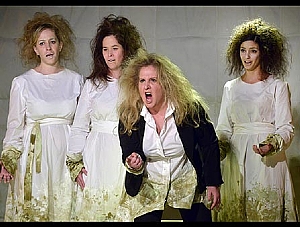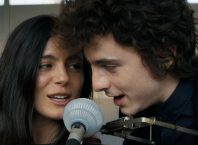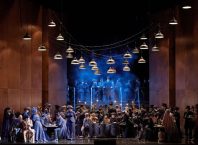
“We are the mothers you don’t remember…” So begins David Sebba’s new work, “Mothers”, which was performed last week at the Israel Opera and will enjoy a four-performance run in May.
“Mothers” is a collection of scenes and stories from the Bible, retold from the point of view of the long-suffering female characters. They have been silenced, ignored or otherwise mistreated, and now they are given a voice. Discrimination in the Bible isn’t limited to women: God preferred Abel’s offering to Cain’s, and with that set off a chain of favoritism. The male characters of the stories in the opera are not given voice, but portrayed instead by a dancer, Eran Abuksis. Even God is sung by a female voice, despite never being referred to as female.
The work is not an opera, but is titled “Operatic Scenes: Recitatives of God – From the Book of Genesis”. David Sebba is the author of the text as well as the music. There is no linear plot; instead the “opera scenes” depict states of mind and raw emotion. The music has a mesmerizing quality, intensifying along with the drama.
Director Shirit Lee Weiss often works with the young talents of the Meitar Opera Studio, which is the alma mater of all four singers in this production. Like Sebba, she is known for her comedic takes on operas, but beautifully conveys the somber atmosphere of the work. The small performance space is a plus – the singers walk around the audience towards the stage, and because of the close quarters every gesture and expression is easy to see and powerfully effective.
Soprano Yael Levita portrays God but has a devilish manner. She rolls up her sleeves as one about to do mischief, watches the characters from a distance, like Iago orchestrating his vengeance plot, and flicks her hands to manipulate the stage lighting. She is a jealous God and has no problem admitting it: “I’ve killed thousands just because I was offended”. Daniela Skorka, as Rivka, Bilhaa and the beautiful Rachel, has an impressive soprano that blends perfectly with mezzos Anat Czarny, who portrays the unhappy Hagar and Leah, and Shay Bloch, whose dark timbre is hauntingly tragic as the aging Sarah.
Maya Meidar Moran’s set and costume design adds a visual experience that completes the operatic experience. The women’s costumes are white but crusted with earth, and together with their messy hair they give an air of neglect. The set design matches their dresses so that they literally blend into the walls. The walls themselves are padded, like a room in an asylum.
Some scenes are painful to watch. In school we learn these stories as a routine, despite the horrific tales they tell. In the process we have become desensitized, and even the Mothers themselves bitterly accuse us of forgetting their existence: “We are the mothers who finished their jobs when giving birth to you.” Sebba’s work defamiliarizes the Biblical texts for an audience that, like the mothers say, has forgotten the characters’ pain.
Despite the wealth of drama it offers, very few operas have been written about the Bible and its characters, even by Jewish composers – perhaps due to fear of angry retorts. Yet except for perhaps some of God’s more sarcastic expressions, the libretto is not at all provocative, and often directly quotes the Bible itself.
“Mothers” has generated a lot of buzz in the Israeli classical music scene. Experience it yourself on the following dates – for tickets and more information, visit the Israeli Opera website.
Thursday May 5th at 21:00
Friday May 6th at 13:30
Thursday May 26th at 21:00
Friday May 27th at 13:30





